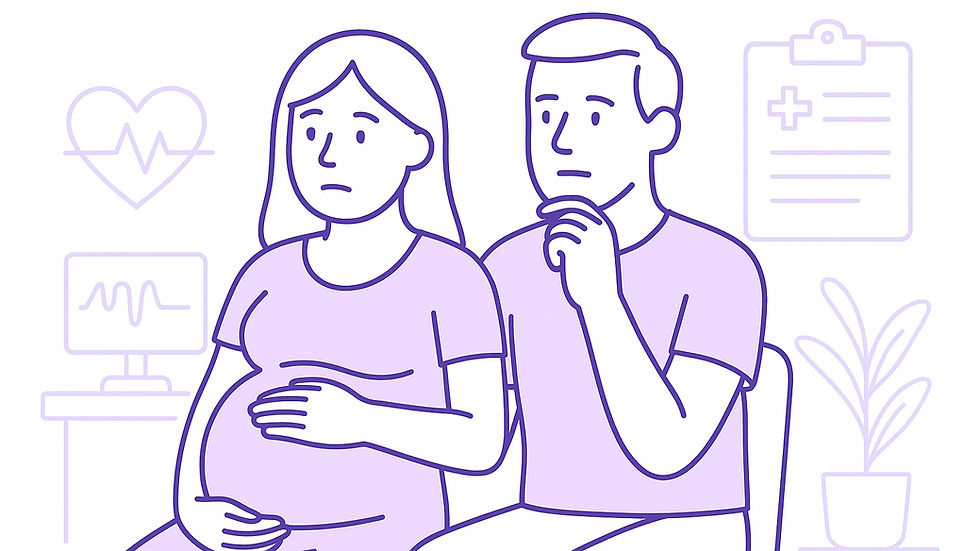Preeclampsia and High blood pressure during pregnancy
- AMALSHA S
- Sep 16, 2025
- 4 min read
Updated: Oct 21, 2025

Pregnancy is an incredible experience, but one not left without challenges. Yes, your way to parenthood can undergo several complications, and the one we are focusing on here is high blood pressure during pregnancy. Also known as hypertension, it can sometimes advance into preeclampsia, affecting both the mother and the baby.
If you are someone dealing with Preeclampsia during pregnancy a careful monitoring is necessary. Symptoms like swelling, headaches, and sudden weight gain, if left unmanaged, can later advance to other risks.
Learning how to lower blood pressure during pregnancy is important, and you don’t always need medication. Here is the guide:
Understanding High Blood Pressure in Pregnancy
Hypertension or high blood pressure during pregnancy is very common. It occurs if the mother already suffers from high BP, or it may develop after 20 weeks of gestation as an on-off event.
When the force of blood against the arterial walls is consistently higher than normal, it leads to hypertension. Apart from being an on-off thing, uncontrolled blood pressure can also lead to preeclampsia, growth restrictions, and sometimes premature delivery.
Hypertension can be chronic or gestational. Chronic hypertension is diagnosed during the early weeks of pregnancy, whereas gestational hypertension develops after the 20th week. The latter usually resolves after childbirth.
White exact causes vary amongst individuals; some common reasons include:
First pregnancy
A very young or an elderly pregnancy
Obesity
Family history of high blood pressure
Kidney or autoimmune condition
High salt and sodium intake
Low to no physical activity
Does it differ from regular high blood pressure?
Yes, unlike regular BP, high blood pressure in pregnancy is tied to hormonal changes and shifts in blood volume and the placenta.
What is the Normal Blood Pressure of Pregnant Woman?

It's natural that your blood pressure may fluctuate during pregnancy. However, knowing the correct parameters can help with self-monitoring.
The normal blood pressure of a pregnant woman is 120/80 mmHg. 120 is the systolic pressure (the force when the heart beats), and 80 is the diastolic pressure (the pressure when the heart rests between beats). It is common for blood pressure to fluctuate a bit during pregnancy, but if your reading is consistently above 140/90 mmHg, it is a sign of high blood pressure.
Note: Blood pressure varies throughout the day. Also, the readings can be slightly lower during early pregnancy and may increase at a later stage.
Signs and Symptoms to Watch For High Blood Pressure During Pregnancy
Your body shows subtle signals if your blood pressure is high during pregnancy. Knowing the early warning signs of high blood pressure can help you control it before things get out of hand. Some common signs are blurred vision, headaches, dizziness, weight gain, and swelling in the face or hands.
Preeclampsia, a serious condition of high blood pressure, has its set of symptoms. You may experience severe headaches, upper abdominal pain, nausea, and sudden swelling. Some women also complain about vision changes, such as flashing lights. While swelling can be normal sometimes, rapid or extreme swelling is alarming.
How to Lower Blood Pressure during Pregnancy?
Many women wonder how to lower blood pressure during pregnancy safely, and believe it or not, you can do that.
The first step to control hypertension during pregnancy is lifestyle adjustments. Following a diet balanced with fruits, vegetables, and whole grains is where it all starts. Stay hydrated and reduce your salt and sodium intake.
Another important step is engaging in moderate exercise approved by your doctor. Walking, prenatal yoga, light stretching, deep breathing, and meditation play an important role.
What Do You Need to Know About Preeclampsia?

Preeclampsia is a complication of hypertension in pregnancy. If you are dealing with preeclampsia, you may be experiencing high blood pressure, increased protein in urine, swelling and bloating, and sudden weight gain.
Even if your BP has previously been in a settled range, it can increase post-20th week of pregnancy, leading to preeclampsia. When left untreated, the condition can cause complications for the mother and the baby, result in organ failure, or sometimes even death.
In some women, it can develop even after birth, and it is known as postpartum preeclampsia.
What is Pregnancy-Induced Hypertension?
Pregnancy-induced Hypertension (PIH) is often known as gestational hypertension; the increase in blood pressure post-conception. It is a very common complication and is directly linked to the changes happening in the body during pregnancy.
While PIH goes away after birth, experienced doctors in Bliss Fertility keep a close eye on it, as sometimes it can result in serious conditions like preeclampsia.
Not every woman with pregnancy-induced hypertension feels symptoms, and therefore regular prenatal check-ups are very important.
When Should You See a Doctor?
Pregnancy means a lot of changes, and some of them are completely normal. But if your blood pressure reading is constantly above 140/90 mmHg, you must immediately see a doctor. Along with signs and symptoms for high blood pressure and preeclampsia, keep monitoring your blood pressure.
Even if your symptoms feel minor, don’t hesitate to check in with your doctor in Bliss Fertility if the baby's movement has decreased.
Conclusion...
Overall, pregnancy is beautiful yet unpredictable. High blood pressure is one of the common challenges, but understanding the signs and keeping up with prenatal visits is all that it takes. Listen to your body, trust your instincts, and there's nothing such as being too cautious.
CTA: Take care of your health during pregnancy. If you have concerns about your high blood pressure during pregnancy, schedule a consultation with the experienced doctors at Bliss Fertility today itself. Call Now
+91 62 62 62 32 62 (Kottayam & Maldives)
+91 88 22 55 66 33 (Tirur)
+91 99 47 70 00 06 (Trivandrum)